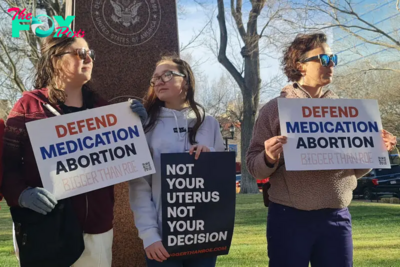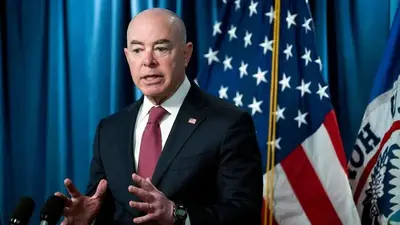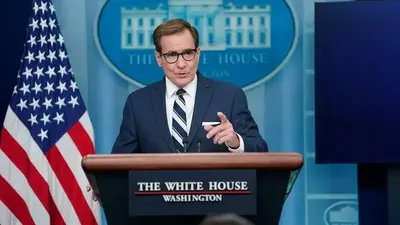Politics
Despite hurdles, DNC members unite behind Biden's proposed primary shake-up
Members of a key Democratic National Committee panel on Friday were largely supportive of President Joe Biden's proposed major changes to Democrats' longstanding rundown of which states get to cast their votes before Super Tuesday.
Most of the more than two dozen members of the DNC group that met Friday focused on rules and bylaws in assessing the impact of of Biden's plan -- which would nix the Iowa caucuses and add Georgia and Michigan to be among the first five voting states. Most notably, the proposal would vault South Carolina -- the state that helped salvage Biden's candidacy -- to the front of the line. Overall, the plan reflects the party's desire to elevate diverse states in the Democrats' electoral process.
The committee is still in the conversation period, and no final decisions have been made.
"We are going through a fight for freedom and a fight for democracy and a fight for representation and fight for being seen. To say that a state like South Carolina should go first -- it sends a message about representation," said Rules and Bylaws Committee member Randi Weingarten. "This is an eloquent way of showing progress of who we are as Democrats. And what this nomination process means."
MORE: Democrats may soon shake up primary calendar: Why it matters and who could replace Iowa

Despite general unity, several members noted that logistical hurdles remain as calendar changes in Georgia and New Hampshire must be approved by Republicans. The DNC acknowledged it cannot dictate individual state law, but said it will grant waivers so that states can offer their secretaries of states in order to tweak dates or make legislative changes.
The strongest resistance came from Iowa -- booted completely from the early window under Biden's proposal -- and early state New Hampshire, whose RBC member Joanne Dowdell said would not accommodate changes to their state law which currently dictates they be the first primary in the window. In Biden's suggested lineup, the Granite State shares an early primary date with Nevada.
"I cannot support the proposal before us," said Scott Brennan, Iowa's committee member on the national RBC.
"Democrats cannot forget about entire groups of voters in the heart of the Midwest without doing significant damage to the party for a generation. Iowa's Democratic caucuses have advanced diverse, historic and often unlikely presidential candidates over the years, including Jimmy Carter, Barack Obama and Pete Buttigieg."
The group of over two dozen Rules and Bylaws committee members are expected to vote on the final early nominating calendar by the end of the weekend.
The White House on Thursday sent Biden's preferred timeline for an expanded five-state early window: it would start with South Carolina's primary on Feb. 6, then Nevada and New Hampshire primaries concurrently on Feb. 13, Georgia on Feb. 20 and Michigan -- which would replace Iowa as a Midwestern early state -- on Feb 27.
MORE: DNC leaders push to change presidential nominating schedule, putting Iowa's first-state status in peril

"Too often over the past fifty years, candidates have dropped out or had their candidacies marginalized by the press and pundits because of poor performances in small states early in the process before voters of color cast a vote. As I said then, 99.9% of Black voters had not had the chance to vote at that point, and 99.8% of Latino voters had not had the opportunity. That is unacceptable in 2024 and it must change," Biden's letter to RBC members said.
Committee member Maria Cardona of Washington, D.C., said she was supporting Biden's suggestions because he took into consideration the committee's long desire for further diversity in the process.
"We are not doing this to honor Joe Biden. President Biden is doing this to honor what the Democratic Party has underscored is our values historically," she said.
South Carolina had originally applied only to be among the states included in the early window, not the first, but Biden's decision to launch it to a first-in-the-nation status garnered swaths of congratulations on Friday.
"Certainly, Democrats in South Carolina are pleased with this," South Carolina's RBC member Carol Fowler said.
Michigan to replace Iowa as the Midwestern early state
Michigan seemingly gained the most support for hosting an early 2024 Democratic presidential primary in the Midwest after RBC members voiced their support for Biden's proposal.
Michigan had lobbied for the change by citing its diverse electorate, large share of labor voices and recent Democratic midterm success despite qualms from some members about its large size, which they said could kneecap lesser known candidates from participating in vast geographies with expensive media markets.
MORE: Iowa caucuses fail to declare Democratic winner after major snafu with reporting results

"[The DNC aims] to increase diversity in the early window and clearly discussions around Michigan actually get that done," Ray Curry, Michigan's committee member on the national RBC said.
"Michigan is the home to more than 500,000 union members. That's more union members than we had in the early window previously, and it's a game changer for working Americans … And one of the most successful things that I'm proud of in November, we accomplished in Michigan was a key piece of being able to take the house and a Senate back."
Rep. Debbie Dingell, who has long championed Michigan's inclusion in the early primary window, celebrated Biden's suggestion to move her state up in a joint statement with Michigan Democratic Party Chair Lavora Barnes.
"We have always said that any road to the White House goes through the heartland and President Biden understands that," they said. "This has been a 30-year effort led by Congresswoman Debbie Dingell and the late Senator Carl Levin to make the early primary states look like the nation … We look forward to having Democrats of all stripes compete in Michigan and see its diversity of people, industry, and regions."
Iowa is out, New Hampshire is shifted under Biden's plan
But Michigan's advancement means the Iowa's caucus -- long subject to National Democratic Party retribution because of it's mostly white electorate and further shift to the right over the past few election cycles -- would not stay in it's storied slot at the top of the nominating calendar, something the Republican National Committee has committed to upholding.
Biden pointedly rejected Iowa's caucus process in his letter to the committee on Thursday night, calling them "anti-participatory."
"Caucuses -- requiring voters to choose in public, to spend significant amounts of time to caucus, disadvantaging hourly workers and anyone who does not have the flexibility to go to a set location at a set time -- are inherently anti-participatory," he said.
Iowa had restructured their infamously complicated caucus earlier this year in effort to push back on any concerns.
"I have the deepest respect for the president in his principles. But the characterization of caucuses set forth in his letter did not reflect any acknowledgement of the historic changes we propose to the Iowa caucuses," said Scott Brennan, Iowa's RBC member.
Brennan noted during the meeting that Republicans would use Democrats' pull away from the rural, middle America voters as fodder during a general election.
"We are creating a self fulfilling prophecy of electoral failure and creating a Fox News bubble for our presidential candidates in which they have no opportunity or responsibility to meet and communicate with voters in red leaning states in the middle of this country," Brennan said.
Rules and Bylaws member Mo Elleithee dispelled Brennan's claim that the DNC was neglecting rural voters with an adoption of Biden's suggestions.
"I do think it is important that we as a party, acknowledge and reaffirm that with this calendar, we are reaching out to people from all communities including rural communities … Catherine Cortez Masto could not have won her reelection had she ignored rural voters"
"I do think it is important that we as a party, hold up with pride, a calendar that allows us to talk to all kinds of voters. and that we not allow the Republicans to disparage what we are doing because I think this calendar makes us more competitive. We don't need to feel defensive about this calendar. When Republicans attack us. We can actually pull this up with pride and say you try to play here."
Committee co-chair James Roosevelt then commented on the nature of the DNC's present relationship with their Republican National counterparts, who he said was "unwilling" to work with them on changes to the calendar and rules.
"That conversation that tells you something about the current status of the Republican National Committee and it leads to the divergence that you've just highlighted in our processes," he said.
Biden's proposal also means New Hampshire's primaries would also be bumped from the first primary in the nation to one of the second-held contests, a move that violates their state law.
"I feel that the President of the United States has made a very bold statement about his vision for this country. The importance of diversity. I don't think there is a person in this room that would argue with any event," New Hampshire RBC member Joanne Dowdell said.
"I will, however, say that New Hampshire does have a statute. We do have a law and we will not be breaking our law," New Hampshire RBC member Joanne Dowdell said.
New Hampshire Democrats expressed their disdain with Biden's decision on Thursday night, shortly after the president put forth his recommendations.
"The DNC did not give New Hampshire the first-in-the-nation primary and it is not theirs to take away. This news is obviously disappointing, but we will be holding our primary first. We have survived past attempts over the decades and we will survive this. Our first-in-the-nation primary has been an integral part of our state's history for over 100 years, and is enshrined in state law," they said.
-

 Politics12h ago
Politics12h agoWhy Trump Actually Needs Mexico
-

 Politics12h ago
Politics12h agoMan Convicted of Killing Laken Riley Sentenced to Life in Prison Without Parole
-

 Politics14h ago
Politics14h agoAmericans agree more than they might think − not knowing this jeopardizes the nation’s shared values
-

 Politics14h ago
Politics14h agoRed flag laws are still used in Colorado’s Second Amendment sanctuaries, just less frequently
-

 Politics18h ago
Politics18h agoHow the Biden Administration Protected Abortion Pill Access—and What Trump Could Do Next
-

 Politics18h ago
Politics18h agoWhy Trump’s Tariffs Could Raise Grocery Prices
-

 Politics1d ago
Politics1d agoThe First Trans Member of Congress Expected Pushback Like Mace’s Bathroom Rule
-

 Politics1d ago
Politics1d agoNew York Prosecutors Oppose Dismissing Trump’s Hush Money Conviction



























